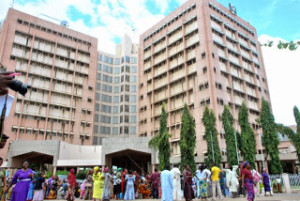 On the 5th of May 2015, APC governors-elect paid a courtesy visit to the president-elect, General Muhammadu Buhari to congratulate him, and in the words of the Imo state governor, Rochas Okorocha, “We have come to notify the incoming president on the challenges ahead of him. As it is today, most states of the federation have not been able to pay salaries and even the federal government has not paid its April salaries”.
On the 5th of May 2015, APC governors-elect paid a courtesy visit to the president-elect, General Muhammadu Buhari to congratulate him, and in the words of the Imo state governor, Rochas Okorocha, “We have come to notify the incoming president on the challenges ahead of him. As it is today, most states of the federation have not been able to pay salaries and even the federal government has not paid its April salaries”.
That the incoming administration will be confronted with monumental economic challenges has been known for a while, considering the gross incompetence with which the Goodluck Jonathan administration managed the Nigerian economy for the past five years. If he needed any reminding, Borno state governor, Kashim Shettima, who was in the delegation, reminded the president-elect of the similarities between the economy he inherited in 1984 and the one he will be taking over in 2015.
Soon to be President, Muhammadu Buhari, as he did as Head of State three decades ago, has a lot of cleaning up to do. The economy is shattered, corruption is rampant and the public sector de-motivated and in disarray. In addition, a number of booby-traps are laying in ambush, awaiting the slightest misstep before exploding in the face of the new government. The most obvious challenge is the problem of unpaid wages; some states owe as much as 11 months accumulated salaries, allowances and pensions.
In proposing solutions to the problem of unpaid wages, the governors suggested the idea of a bailout for states by the federal government. As unpalatable as the idea may seem, it may be the only way out for several states. States like Osun simply do not have the funds to pay salaries even if they were to commit every kobo collected from the federation account and internally generated revenues to payment of salaries. No one is talking of social services and infrastructure development. Collectively, it is estimated that 26, out of Nigeria’s 36 states are unable to meet their salary obligations.
The problems are deeper. Even if the new administration is able to declare a state of emergency and helps indigent states to offset their salary arrears, it would only be a matter of months before unpaid wages accumulate again. Now that the federal government has to borrow to pay the salaries and entitlements of its workers, what would states do, assuming that they are able to find anyone to lend them money?
Even if Buhari was elected to be president of the civil service of Nigeria, the problems confronting that sector alone would be enough to keep him occupied for the next four years. But the public sector is just one of the hundreds of challenges demanding the attention of the new president.
So how does Buhari deal with the public sector? How would he reform the civil service, bearing in mind that an efficient and effective public sector is key to building strong institutions and vital in achieving the change he promised Nigerians?
The Nigerian public sector has undergone a series of reform efforts, mostly geared at cutting waste, improving efficiency and enhancing professionalism. Unfortunately, few of those reforms ever saw the light of day, and fewer still were successfully implemented. Some argue that the sector is too large, and that it consumes an inordinate share of Nigeria’s wealth. They insist on a ‘right-sizing’ of the federal staff strength. However, which government can contemplate sacking workers when unemployment is already at outrageous levels?
Another option is to reduce the number of agencies – and the cost of running – them without necessarily sacking people. Ahmed Joda, who incidentally is the chairman of the president-elect’s transition committee, had 15 years ago in the year 2000, headed a panel which submitted a White Paper on the Review, Harmonisation and Rationalisation of Federal Government Parastatals, but it was not implemented.
The more recent attempt is the Steve Oronsaye committee which was set up in 2012. The committee recommended the scrapping of 102 statutory agencies from the current 263, abolition of 38 agencies, merger of 52 and reversion of 14 to departments in the ministries.
The 800-page report also recommended the discontinuation of government funding of professional bodies and councils, among many others. How far and fast Buhari implements the report – which was deliberately left on the burner by the Jonathan administration – is something that must be carefully managed.
Ultimately, the main issue must be how the new government can implement the key elements of the Oronsaye report without needlessly sacking workers. Buhari’s government must revisit the now abandoned monetization policy, track Nigeria’s foreign and domestic debts, manage the current fuel scarcity/ subsidy matter, diversify government revenue sources, cut waste and leakages in government and preempt the several unresolved labour issues waiting for him.
Buhari identified the backlog of salaries owed to public workers as one of the headaches he would face as president. General, that headache is a symptom of much, much deeper malaise within the public sector.